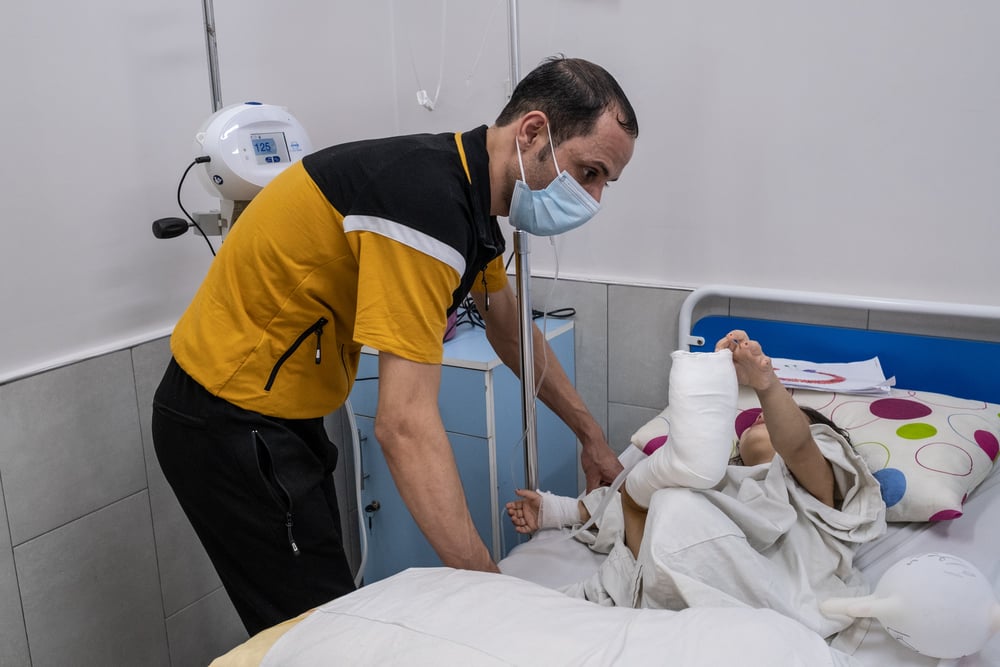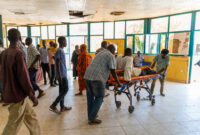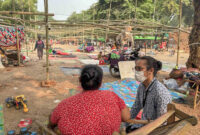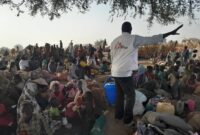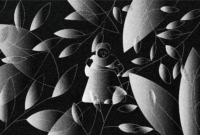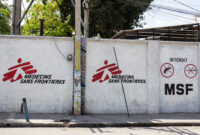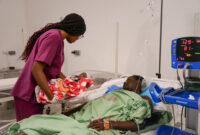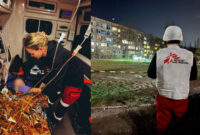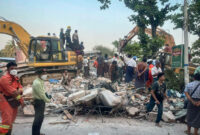Treating child injuries in blockaded Gaza
In the Al-Awda hospital paediatric unit in northern Gaza, Mohammed Aboud, a father of five, comforts his four-year-old daughter Hala as she slowly wakes up after her surgery.
The scene is all too familiar to Mohammed now. Over the last few weeks, Hala has already been operated on five times.
On 14 July 2021, Mohammed was praying in his house in Beit Lahia, a neighbourhood north of Gaza city, when he suddenly heard his daughter screaming.
He rushed outside but Hala was nowhere to be seen. She had crossed the road in front of her house and been hit by a car.
A neighbour who witnessed the accident told Mohammed that Hala had been taken to a hospital and gave him the phone number of the driver.

When Mohammed arrived at Al-Awda, he was informed by doctors that Hala’s right foot had been crushed when the car ran her over.
“When I saw her, I was shocked,” he says. “I hadn’t imagined her injury would be that bad.”
Large open wounds like Hala’s are prone to infections. “She arrived at Al-Awda hospital with a deep wound,” explains Dr Hafez Abu Khossa, who treated Hala.
“We cleaned the wound and took bone and tissue samples to determine what infection she was suffering from. This allowed us to prescribe the correct type and dosage of antibiotics.
“Next, we used a procedure called vacuum-assisted closure to close up the wound and help it heal faster.
“Now, our goal is to treat the infection and to avoid any further contamination before we can apply a skin graft on her foot. It’s a long process and will require several procedures.”
Dr Khossa confirms that her wound was particularly severe. “Each change of dressings needs to be done in an operating theatre under anaesthesia.”

While bone infections can be treated with antibiotics, antibiotic resistance in Gaza is widespread.
This is due to misuse of antibiotics and their accessibility without prescription in the local markets. In 2019, MSF worked with the Ministry of Health to establish a microbiology laboratory, which allows clinical teams to determine the exact type of bacteria causing the infection and which antibiotics it is resistant against.
Alongside this, MSF is also helping healthcare staff understand and improve antibiotic prescribing and use.
The high chance of resistance makes treating bone infections a colossal undertaking. The approach of the medical team at Al-Awda hospital is holistic and focuses not only on the medical treatment of the patient such as surgical treatment, physiotherapy and pain management, but also on supporting their caretakers, most often a close relative.
A mental health counsellor meets regularly with Hala and her family to help them heal from this traumatic experience, ensuring she has the best chance of recovery.
This approach and such specialised treatment are rare in Gaza, as most humanitarian funds and efforts are directed towards emergency responses, to treat conflict-related trauma injuries or, more recently, towards the COVID-19 response. Consequently, other health needs, such as paediatric trauma care, are often deprioritised.
Within paediatric care priority is given to acute trauma cases like Hala’s, and children with chronic problems stemming from old burns and traumas or congenital conditions must often wait a long time for treatment.
“MSF was already treating trauma patients, but to relieve the pressure on healthcare facilities, it extended its patient admission criteria and began seeing patients with chronic issues stemming from old burns and traumas, with many in paediatrics,” explains Benoit Vasseur, MSF country representative in Gaza.

A month after her arrival at Al-Awda hospital, Hala’s foot is starting to heal and she is now ready for a skin graft.
The road to recovery is still long, but Mohammed is happy to see his daughter getting better.
If everything goes well, Hala should be able to leave the hospital in the coming weeks. She will still have to take antibiotics for a while to treat the infection, but will be able to be with her family, who have been waiting impatiently for her to finally come home.
